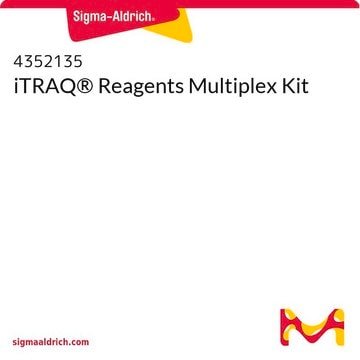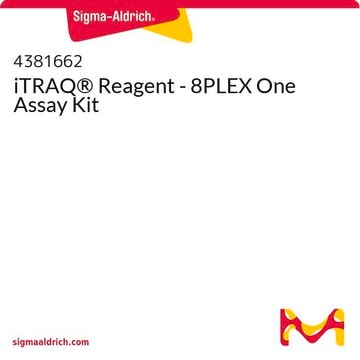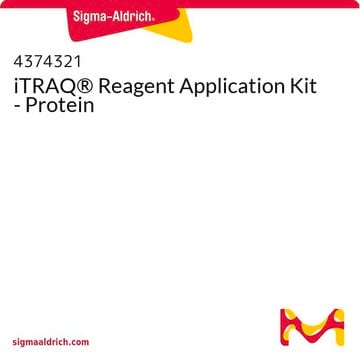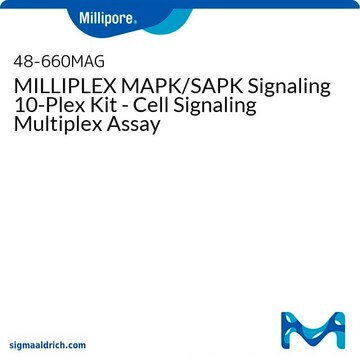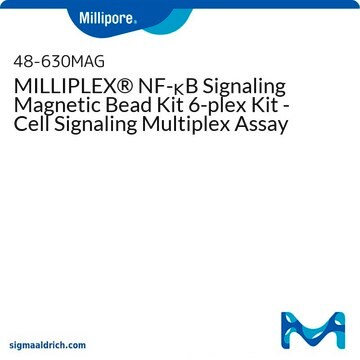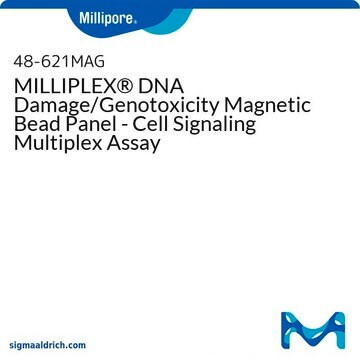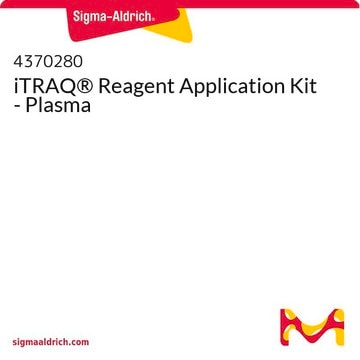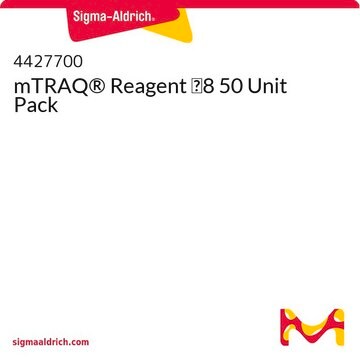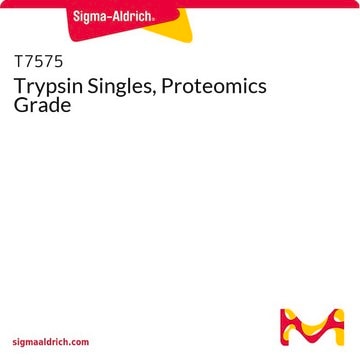4381663
iTRAQ® Reagent - 8PLEX Multiplex Kit
Synonym(s):
iTRAQ 8-Plex
Sign Into View Organizational & Contract Pricing
All Photos(1)
About This Item
UNSPSC Code:
12161503
NACRES:
NA.24
Recommended Products
Quality Level
storage temp.
−20°C
Looking for similar products? Visit Product Comparison Guide
General description
Contains iTRAQ® Reagents 113, 114, 115, 116, 117, 118, 119 and 121 and sufficient material for five 8-plex assays. Multiplex Buffer kit (Cat. No. 4381664) to be ordered separately.
Cat. No. 4381663 contains the equivalent reagents in the Sciex iChemistry® product number 4390812.
Cat. No. 4381663 contains the equivalent reagents in the Sciex iChemistry® product number 4390812.
The isobaric tags for relative and absolute quantitation (iTRAQ®) reagents are the first set of multiplexed, amine-specific, stable-isotope reagents that can label all peptides in up to eight different biological samples enabling simultaneous identification and quantitation, relative and absolute, while retaining important post-translational modification (PTM) information. The iTRAQ Reagents - 8plex kits are available in more economical bulk packs.
Application
iTRAQ® Reagent - 8PLEX Multiplex Kit has been used:
- to derivatize and label the tryptic digests of the iodoacetamide probe (IPM)-labeled HeLa proteome
- in isobaric tags for relative and absolute quantitation (iTRAQ) labeling of peptides
- as isobaric labels for the comparative quantification of proteins between the digested samples in proteomic analysis
Features and Benefits
- Simultaneously identify and quantify proteins from multiple samples
- Expands protein and proteome coverage by labeling all peptides, including those with post-translational modifications (PTMs)
- Increases confidence in identification and quantitation from MS/MS spectra by tagging multiple peptides per protein
- Increases throughput and confidence in results for protein biomarker discovery studies
- Offers a simple workflow without sample fractionation for reduced-complexity samples, such as affinity pull-downs
- Provides the flexibility to multiplex up to eight different biological samples simultaneously in a single experiment
- Fully supported by ProteinPilot Software on all SCIEX proteomics LC/MS/MS platforms
Analysis Note
To view the Protocol for the iTRAQ Reagents 8-plex Kit, please visit this Protocol link.
To view the Chemistry Quick Reference Card for the iTRAQ Reagents, please visit this Chemistry Quick Reference Card link.
To view the Chemistry Quick Reference Card for the iTRAQ Reagents, please visit this Chemistry Quick Reference Card link.
Legal Information
iChemistry is a registered trademark of AB Sciex Pte. Ltd.
iTraq is a registered trademark of AB Sciex Pte. Ltd.
Signal Word
Danger
Hazard Statements
Precautionary Statements
Hazard Classifications
Acute Tox. 4 Dermal - Acute Tox. 4 Inhalation - Acute Tox. 4 Oral - Eye Irrit. 2 - Flam. Liq. 2
Storage Class Code
3 - Flammable liquids
Flash Point(F)
35.6 °F - closed cup
Flash Point(C)
2.0 °C - closed cup
Choose from one of the most recent versions:
Already Own This Product?
Find documentation for the products that you have recently purchased in the Document Library.
Customers Also Viewed
Hongzhi Liu et al.
Oncology letters, 16(1), 335-345 (2018-06-22)
Metastasis and recurrence following surgery are major reasons for the high mortality rate and poor prognosis associated with hepatocellular carcinoma (HCC). Cancer stem cells (CSCs) are thought to be able to cause cancer, and to be the primary cause of
Shaoli Liu et al.
Journal of microbiology and biotechnology, 30(2), 187-195 (2019-11-23)
To understand the molecular mechanism involved in the survivability of cold-tolerant lactic acid bacteria was of great significance in food processing, since these bacteria play a key role in a variety of low-temperature fermented foods. In this study, the cold-stress
He Wang et al.
Archives of oral biology, 89, 9-19 (2018-02-07)
This study aimed to compare the proteomic profiling of human dental pulp stem cells (DPSCs) and periodontal ligament stem cells (PDLSCs) under in vitro osteogenic induction, which imitates the microenvironment during osteo-/odontogenesis of DPSCs and PDLSCs. The proteomic profiles of
Juan Jin et al.
Biomarkers in medicine, 14(10), 839-854 (2020-08-29)
Background: Proteome studies for multiple renal diseases is bare. Methodology & results: Using isobaric tags for relative and absolute quantitation labeling, many differentially expressed proteins (DEPs) were identified in acute kidney injury (AKI), AKI + chronic kidney disease (CKD), diabetic CKD and
Jesús Alejandro Zamora-Briseño et al.
Frontiers in microbiology, 11, 1084-1084 (2020-06-18)
The Caribbean spiny lobster Panulirus argus (Latreille, 1084) sustains economically valuable fisheries throughout the wider Caribbean region. This species is currently affected by the pathogenic virus Panulirus argus Virus 1 (PaV1) that causes a systemic and chronic-degenerative infection in juvenile
Our team of scientists has experience in all areas of research including Life Science, Material Science, Chemical Synthesis, Chromatography, Analytical and many others.
Contact Technical Service